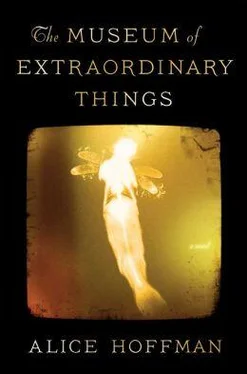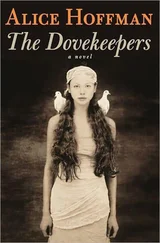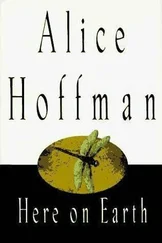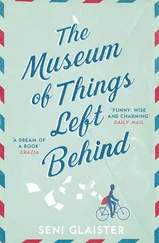The Wizard didn’t seem to think much of me when I met him on the street and asked for work. As always he was fashionably dressed despite his girth. He wore a blue serge suit and a top hat. His secretary was with him, a thin bad-tempered man named Solomon, whose duty it was to keep the Wizard’s many admirers away. I pushed past the secretary and walked beside Hochman as if I had a right to accost him. He eyed me coolly, and yet a smile played at his lips. He liked people with spirit. He said he had never employed an Orthodox Jew, though he himself was a pious man. He feared my father would make trouble if I worked for him. He suggested that I should go back to my studies and leave the wicked world to men who knew how to deal with such matters.
“My father has no say in my life,” I told Hochman. In the newspapers the Wizard was referred to as Doctor or Professor, but I was fairly certain he had no degree. He took out a cigar and offered me one, but I refused. I didn’t want him to catch me choking on the smoke.
“Why is that?” he asked. “A father is a father, Orthodox or not.”
“You’re so smart, you tell me.”
I had nerve, but my matter-of-fact retort did the trick. Hochman all-out grinned as he hired me, thinking an Orthodox boy dressed in black with long hair would have a special sort of access, and that people would confide in me. As it turned out, he was right. Men told me their loathsome tales, how they’d run away from their nagging wives or fallen in love with a Christian woman, how they had a right to their freedom. I was a good listener, and I didn’t make pronouncements. I was so accomplished at what I did that Hochman soon paid me double what I earned at the factory. Much to my father’s distress, I quit my job as a tailor. I spent my mornings sleeping, and my nights on the streets. Hochman was quite famous, and even the Times went to him when children were missing or when there was a crime the police could not solve. My status in the neighborhood either ascended or was deeply tarnished by my new occupation depending on who you were and what you believed.
That winter I found one of the missing children who had been written up in all the papers. It was front-page news for a time. An Orthodox boy of seven was missing. It was thought he’d been kidnapped, perhaps by an employee of one of those houses on Third Avenue where sex was cheaply bought. I questioned several of his friends on the street where he lived, and they all told me the same thing—this boy was a wanderer. He often climbed down the fire escape in the middle of the night. He liked to ramble along the East River, where he dreamed of running away to sea. I began to search the pathways that ran along the river. Every now and then I came upon a group of displaced individuals, lost men with no homes and no goal other than to stay alive. These poor souls lived on the edge of the city, scavenging what they could. I knew enough to stay away from these men, who would bash in a fellow’s head in order to steal his boots. Because I was tall I seemed older than my age, and I cursed a blue streak if anyone approached, therefore no one accosted me. I had taken to carrying a knife for my protection, and once or twice I showed it when someone began to follow me.
I discovered the missing boy beneath the Brooklyn Bridge, a feat of construction considered to be one of the wonders of the world. The boy lay in a pipe that allowed water to rush from the streets into the river. I guessed he had sneaked out, then gone too far. It was likely that he’d become exhausted and had curled up to sleep, freezing to death as the snow fell. I understood what it was like to want to run away from home, and maybe that was why I felt so disturbed. I shook his shoulder, but he didn’t respond. I pulled him out of the pipe and sat beside him for a long time. The truth was, for all my bravado, I had never seen a dead body before. Though many in our village had been killed, they had become cinders that rose up with the wind. I could not look into this boy’s face. I thought I would be haunted if I did, and he would then follow me from that place. I kept my eyes averted as I covered him with a blanket I found nearby. I was naïve; I thought the dead could still feel cold. I folded my coat into a pillow, for I was convinced that the dead wished for comfort as well. As I left, snow began to fall again, and I was grateful, hoping when the police brought the boy’s mother here, she would be spared the aura of death that clung to this miserable place, and would instead see something that might resemble heaven, a bank of white, a boy who slept peacefully, his head resting on my coat.
There was a huge funeral, paid for by Hochman. The dead child’s mother clung to the Wizard’s arm as if he were her savior. There were photographs on the front page of every newspaper. I knew Hochman’s business would double and because of this my pay would increase. At the age of twelve I earned enough to buy myself a new coat, and I bought one for my father as well, but he never wore it. It stayed in a box, kept beneath the bed. From then on, I spent the money on myself.
I soon became the boy Hochman turned to with his difficult cases. I had a sense of where the lost might go, since I was, in my own way, one among them. Still, I was not prepared for the degradation that I saw. I was a harsh judge of the men who left the families they’d once claimed to love, but I didn’t set myself above them. I judged myself as well. That is why I knew how to find them, and why I was Hochman’s best boy. I knew what it was like to fail someone.
I saw the alleyways and tenements of the Lower East Side as a place where good people could not win out against the devil. There was an underworld that decent men like my father knew nothing about. It could pull a person down into it when he least expected it to, and it tugged at me. I did things I was not proud of, mostly behind the alehouses where women all but gave themselves away. Still, I excelled as a finder of lost men, my habits of insomnia and mistrust benefiting me in this work. I was such an asset to Hochman that he told me he wished he had a son as bright as I. I’d heard that before, from my father’s friends.
I could not think of anything I would have wanted less.
The streets that I knew made me sick at heart, and, though I provided my father with a better life, with food we could have not afforded on his factory salary, when he looked at me I felt he despised me. I still had the urge to be alone.
One night I found myself walking to the hills of upper Manhattan, farther north than I’d ever been before. The city fell away beyond Morningside Heights. Between the residential areas there were patches of dark greenery, and then, at last, the woods that were filled with a weave of birdsong. There were still a few farmhouses on the cliffs of hard, white marble, and I heard cowbells ringing, as if I had stumbled upon a world of pastures. I passed the flooded juncture where the Hudson ran into the Harlem River in the area the Dutch called Spuyten Duyvil. Here there were oysters as large as a man’s hand, and herons lingered over the marshes, building nests out of sticks in the tall locust and sycamore trees. Fishermen stood on the bridges angling for striped bass, bluefish, porgy, and flounder, as well as the mysterious hard-to-catch eels. Skiffs floated near the best fishing holes. I imagined I might never go home; I could live in the woods, feed myself with oysters and rabbits, foods that were denied to me because our people kept kosher and were forbidden from eating such creatures.
Читать дальше













